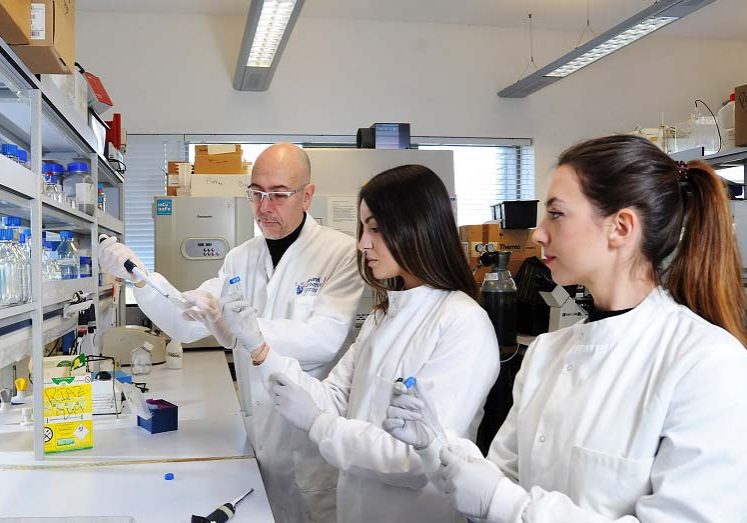New Treatment Options for Adenoid Cystic Carcinoma
The role of a novel axis in adenoid cystic carcinoma :
therapeutic implications
Tag: New treatment

Project type:
PhD
Project Leader:
Prof Arturo Sala
Researcher:
Ylenia Ciciro
Commencement date:
October 2019
Length of project:
Three years
Funding provided:
£150,000
Funder:
Oracle Cancer Trust
Location:
Brunel University, London
This rare cancer that mainly affects women has no effective treatment if the cancer recurs following surgery. And, with low long-term survival rates, Oracle Cancer Trust is dedicated to funding research to discover potential breakthroughs for this devastating type of cancer. This project at Brunel University is headed by Prof Arturo Sala, who is an expert in rare diseases. This research is investigating the role of a gene, MYB, that is frequently altered in ACC and thought to be a cause of radio and chemo-resistance. Researchers are testing whether disruption of activity associated with the gene could therefore cause enhanced sensitivity of cancer cells to radiation and/or chemotherapy with the ultimate objective of improving treatment and survival of cancer patients
Adenoid Cystic Carcinoma (ACC) is a rare form of adenocarcinoma, a type of cancer that begins in glandular tissues (a group of cells that produce and release substances such as hormones into the bloodstream). ACC arises within glands most commonly in the major and minor salivary glands of the head and neck.
ACC accounts for about 1% of all cases of head and neck cancer. It is more prevalent in women, accounting for nearly two thirds of all new cases diagnosed. A contributing factor to this gender difference is due to the number of cases at female and male specific sites, accounting for 14.5% and 0.4% of cases overall.
The cause of ACC is currently unknown, however it does not appear to run in families. There is evidence that it likely develops from genetic changes that occur over the patient’s lifetime, and, although the changes may be caused by environmental exposures, there are no strongenvironmental risk factors for ACC that have been identified to date. The genetic mutations are only present in the cancer cells, and not in the egg and sperm cells which are passed on to the next generation. Research data on ACC is low so it is still unknown whether a parent with ACC can increase the chance of a child developing the disease.
Contrary to other head and neck cancers, lifestyle choices such as smoking or alcohol use are not linked to increased risk of ACC. Infection by the human papilloma virus (HPV) also does not seem to increase risk.
There has been evidence that ACC tumour cells are associated with the presence of too much of a protein called “myb,” and with the inactivation of the p53 tumour suppressor gene in advanced disease.
The p53 gene normally limits cell growth by monitoring the rate at which cells divide, and thus its suppression could result in uncontrolled cell growth.
Symptoms of adenoid cystic carcinoma, which may include headaches and seizures, depend on the tumour’s location. Tumours on the salivary glands may cause painless masses in the mouth or face. Tumours of the lacrimal gland (small almond-shaped structure that secretes tears and is located just above the upper, outer corner of each eye) cause a bulging eye or changes in vision. Those situated in the windpipe or voice box may cause respiratory symptoms or changes in speech.
More advanced tumours may spread along the nerves, resulting in pain and nerve paralysis. It may also spread through the bloodstream. In contrast to most head and neck cancers, ACC rarely spreads to the lymph nodes, occurring in about 5% to 10% of cases.
Both new and recurrent tumours may be identified by a CT scan or MRI. Biopsies followed by an assessment are used for diagnosis.
Treatment depends on many factors and may include surgery, radiation, and/or chemotherapy.
Unfortunately, ACC arising in the head and neck is typically an aggressive form of cancer that has a poor prognosis but tumours arising in some sites (such as the breast, although rare) may have a better prognosis. Its slow but relentless growth means it can spread to other parts of the body before any symptoms arise, such as the lungs, liver or bones, where it is more serious. ACCs are also particularly prone to recurrence. About 90% of patients will survive at least 5 years, but this quickly drops to only 40% surviving 15 years.

Help fund this project
For more information on funding our Research Projects please email us
Donate now and together we can save more lives by beating cancer sooner.


